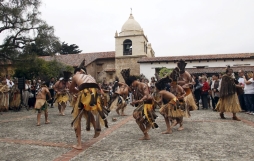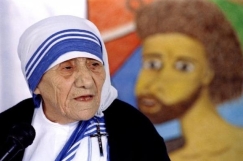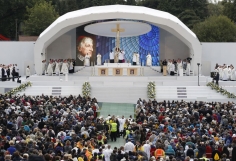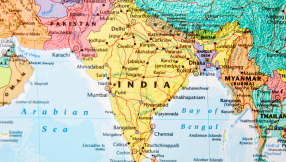Depending on your church background, the question of who Mary is will provoke very different answers. We can all agree that she was the human mother of the Son of God, and for that reason alone she is significant. From this point forward, church teaching diverges rather a lot.
Popular belief is that Mary splits the church down the middle between Catholics and Protestants; that Catholics love, and even worship Mary, while Protestants largely dismiss her. While there are elements of truth in both these conclusions, as so often is the case, the true value of Mary is not found by hiding out in either camp.
Catholic theology on Mary – Mariology – is extensive. She has inspired paintings, hymns and prayers. Popes have encouraged the veneration of Mary and practices related to it have become integral to Catholic culture.
Surrounded by tradition are four dogmatic teachings about Mary which can help evangelicals understand how Catholics think about her identity and her relation to Christ:
1. Mother of God
"Mary is truly 'mother of God' since she is the mother of the eternal Son of God made man, who is God himself," says the Catechism of the Catholic Church.
This isn't too scary – the fact that Mary was the mother of Jesus is not news to evangelical ears. The important thing here is that she was the mother of God not just a baby called Jesus, who later became God. It actually has more to do with the status of Jesus than the status of Mary – in the early church this was formalised in 431 to defend against the belief that Jesus' divinity was not innate.
2. The Assumption of Mary
We are now on less familiar territory. This dogma states that Mary was assumed into heaven with body and soul. Rather than dying and her soul going to heaven, Catholic dogma states that: "when the course of her earthly life was finished, was taken up body and soul into heavenly glory."
The thought behind it is linked with the next dogma – the immaculate conception – that, as one without sin, she was not subject to its punishment of death. Some Catholics believed she died first and then was miraculously resurrected before being assumed, while others believe she did not die at all.
3. The Immaculate Conception
Here is where most Protestants become a little uncomfortable.
Not to be confused with the virgin birth, the dogma of the immaculate conception refers to the Catholic belief that Mary was conceived without original sin. Official Catholic teaching is that, from her conception, Mary was innocent: unlike the rest of the human race, she was not touched by original sin. From the moment she was created, she was filled with divine grace.
Pope Pius XII said: "Who will dare to doubt that she, who was purer than the angels and at all times pure, was at any moment, even for the briefest instant, not free from every stain of sin?"
Due to her role in the in the economy of salvation, Catholics believe that Mary was protected from sinning as a gift from God to enable her to become the stainless Mother of God. Protestants believe that only Jesus was free from sin.
4. The Perpetual virginity of Mary
This dogma teaches that Mary was a virgin not only before giving birth to Jesus, but that she remained a virgin until her assumption. This belief – which is not unique to Catholicism – holds that Mary was ever-virgin, making Jesus her only biological son. Where Jesus' brothers are mentioned in the Gospels, they suggest it refers to a broader family relationship, as they were never called "sons of Mary".
While none of these four dogmas denote the divinity of Mary, there is a tendency in Catholicism to focus on Mary at the expense of Jesus.
Some Catholic traditions emphasise Mary as mediatrix – interceding for our salvation. Catholics maintain that Jesus is the only mediator between God and man, reconciling us to God through his death and resurrection, however they find a secondary mediating role for Mary. Just as Protestants ask for others alive to intercede for them, so the Catholic tradition teaches that Mary – alongside the communion of saints – is an intercessor. While Catholics maintain that there is no infringement on the doctrine that salvation is through Christ alone, Protestant thinkers have seen this as a point where Catholic thought on Mary moves into idolatry.
We need to un-muddy the waters between the high admiration of the grace of God seen on a human being, and worship of another creature.
The answer, however, is not found by abandoning Mary altogether: evangelicals need to develop a positive view of Mary, based on the Bible alone. As New Testament Scholar Scot McKnight pointed out, we know more about Mary than almost any other character in the New Testament, apart from Jesus, Peter, Paul and John:
"Think about it: we know her husband, Joseph; we know Mary's relatives, Zechariah and Elizabeth; we know a song she sang called Magnificat; we know she traveled from Galilee to the hill country and from Galilee to Bethlehem; we know she and Joseph dedicated their baby boy Jesus in the temple; we know they visited the temple with Jesus when he was twelve; we know she at least considered Jesus capable of rectifying a lack of wine at a wedding in Cana; we know she walked from Nazareth down to Capernaum with her children in tow to visit with Jesus; we know she was at the crucifixion of Jesus in Jerusalem; we know she was with the first Christians in Jerusalem in Acts 1; we know at least one of her sons — James — became a major church leader; it is likely that she became central to the cosmic story of redemption (Revelation 12)."
Through Mary, Jesus belongs to the human race, and there is much to be learned from her. As reformed Protestant theologian, Karl Barth, said, Mary is "full of grace", but this grace is not earned but totally given to her. Her sinlessness is not found in the Bible and is a matter of Catholic Church tradition.
She is an example of a woman of courage, who said yes to God's call on her life at a young age. Honour can be bestowed on her, not through elevating her ontologically, but by recognising that as a human predisposed to sin, she chose to say yes to God's call, despite knowing her choice would lead to suffering. Consequently, she is the mother of God. She is an example of how God uses those who are willing.
Mary's life in the New Testament does not point to her special status, but to her Son's. From Mary's song through to her at the cross and with the earliest believers in Jerusalem, she pointed to Jesus. Her mission was ever to witness to the glory of her son, not to rob him of it.
















